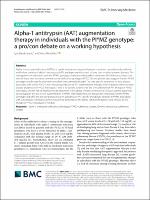| dc.contributor | Vall d'Hebron Barcelona Hospital Campus |
| dc.contributor.author | Barjaktarevic, Igor |
| dc.contributor.author | Miravitlles Fernández, Marc |
| dc.date.accessioned | 2022-03-17T09:41:10Z |
| dc.date.available | 2022-03-17T09:41:10Z |
| dc.date.issued | 2021-03-23 |
| dc.identifier.citation | Barjaktarevic I, Miravitlles M. Alpha-1 antitrypsin (AAT) augmentation therapy in individuals with the PI*MZ genotype: a pro/con debate on a working hypothesis. BMC Pulm Med. 2021 Mar 23;21:99. |
| dc.identifier.issn | 1471-2466 |
| dc.identifier.uri | https://hdl.handle.net/11351/7199 |
| dc.description | Deficiencia de alfa-1 antitripsina; Genotipo; Enfermedad pulmonar |
| dc.language.iso | eng |
| dc.publisher | BMC |
| dc.relation.ispartofseries | BMC Pulmonary Medicine;21 |
| dc.rights | Attribution 4.0 International |
| dc.rights.uri | http://creativecommons.org/licenses/by/4.0/ |
| dc.source | Scientia |
| dc.subject | Pulmons - Malalties obstructives - Tractament |
| dc.subject | Glicoproteïnes - Ús terapèutic |
| dc.subject.mesh | Pulmonary Disease, Chronic Obstructive |
| dc.subject.mesh | /drug therapy |
| dc.subject.mesh | alpha 1-Antitrypsin |
| dc.subject.mesh | /therapeutic use |
| dc.title | Alpha-1 antitrypsin (AAT) augmentation therapy in individuals with the PI*MZ genotype: a pro/con debate on a working hypothesis |
| dc.type | info:eu-repo/semantics/article |
| dc.identifier.doi | 10.1186/s12890-021-01466-x |
| dc.subject.decs | enfermedad pulmonar obstructiva crónica |
| dc.subject.decs | /farmacoterapia |
| dc.subject.decs | alfa 1-antitripsina |
| dc.subject.decs | /uso terapéutico |
| dc.relation.publishversion | https://doi.org/10.1186/s12890-021-01466-x |
| dc.type.version | info:eu-repo/semantics/publishedVersion |
| dc.audience | Professionals |
| dc.contributor.organismes | Institut Català de la Salut |
| dc.contributor.authoraffiliation | [Barjaktarevic I] Division of Pulmonary and Critical Care Medicine, David Gefen School of Medicine at University of California Los Angeles, Los Angeles, CA, USA. [Miravitlles M] Servei de Pneumologia, Vall d’Hebron Hospital Universitari, Barcelona, Spain. Vall d’Hebron Institut de Recerca (VHIR), Barcelona, Spain. CIBER de Enfermedades Respiratorias (CIBERES), Barcelona, Spain |
| dc.identifier.pmid | 33757485 |
| dc.identifier.wos | 000634781000002 |
| dc.rights.accessrights | info:eu-repo/semantics/openAccess |

 Área privada
Área privada Contacto
Contacto







